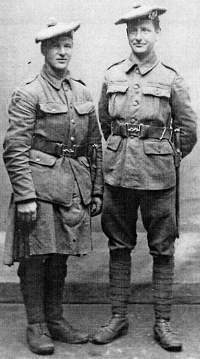The village in which I grew up is geographically unstable. When my father was a boy, it was in Derbyshire; for most of my childhood it was in Cheshire and it is now in Greater Manchester. It is making a slow journey northwest and, some time next century, I expect it to emerge into the Irish Sea.
The reason for my outbreak of nostalgia for the North West is a production of The Accrington Pals at the Plaza Theatre, Romsey. Accrington is, of course, firmly planted in Lancashire. If you want to get a feeling for the sound of Accrington, start by listening to the warm voice of the writer Jeanette Winterson. (Indeed, even if you don’t want to know about the accent, she’s still worth listening to.) Winterson has lived away from the north for a long time, and I suspect that she has lost some features of her native speech, but, for example, she still pronounces “poor” as a diphthong. I would expect rhotic speech in Accrington – speakers pronouncing the letter r before a consonant – the classic would be the r in Blackburn. That feature peters out as you approach Manchester, so has never been a part of my way of talking. Nevertheless, there’s still a common north west core that takes me back to my roots.

The Accrington Pals is about the First World War and a battalion that lost thirty percent of its manpower in a single half-hour action during the battle of the Somme, with even more wounded. I don’t think there was a Pals battalion from my home area, but at least two of my great uncles served during World War 1. One lost an arm in action, but in the context, the family got off lightly.
The costuming of the Romsey production reminded me of old family photographs, with the women’s floor-length skirts, protected by floor-length aprons. Thinking about this now, it seems all very well to defend clothes against attack from the front, but what about attack from below? Surely the women would have spent enormous amounts of time cleaning and repairing the hems that were sweeping the streets.
Despite the carnage of the first world war, and the genocide of the Second, Steven Pinker asserts, in The Better Angels of Our Nature, that taking the historical perspective, humanity is becoming less violent. He backs-up the assertion with a lot of statistics (some of which have been challenged). Interesting evidence came recently from The Proceedings of The Old Bailey which records the cases tried in the court from 1674 to 1913. The archive has now been digitised, which means that it has become a searchable data source. A team of mathematicians and historians is using computers to search for patterns in the data (New Scientist, 28 June, 2014). One of the things they have found is a change in society’s attitude to violence. In the earlier records, robbery with violence was treated as theft – a crime against property – whilst more recently the violence was framed as an additional charge. Violence has moved from being a personal matter, ignored by the courts, to being a matter for society and for the state (on behalf of society) to intervene.
Another of the elements of The Accrington Pals that brought Jeanette Winterson to mind was that she was brought-up in an evangelical household (in her case, Pentecostalism). One of the Pals is a Primitive Methodist lay preacher who invokes God in almost every sentence – something that seems alien to those of us not steeped in that evangelical stream, and yet the role was played in a way that made it seem perfectly natural. When he joins up, he leaves his wife behind to bring-up their teenage son. Her approach to discipline involves the application of a leather belt. This was not uncommon. In the play, other characters are appalled by the severity, but not surprised at the act itself, and not looking to the intervention of authority. Some years ago, in a quiet conversation with my maternal grandmother, I learned that she had applied the same approach to discipline when bringing up her children in Manchester in the 1920s and 30s.
We have become less tolerant of beating children, and more sensitive to such violence, but it has been a slow process.